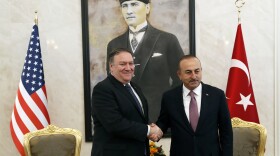-
The U.S. secretary of state is in Ankara, where the Turkish government alleges journalist Jamal Khashoggi was murdered by Saudi agents, a charge Riyadh denies.
-
Sheikh Saleh al-Luhaydan warned women against driving cars by saying it could affect their ovaries. His comments come a month before a planned day of disobedience, when activists will call for women to drive 鈥� a right they do not have in Saudi Arabia.
-
The film, about a young girl who desperately wants a bicycle, is the first feature made entirely in Saudi Arabia. Director Haifaa Al Mansour joins host Rachel Martin to talk about making the film in a country where Mansour couldn't work outdoors unsupervised.
-
Scientists find the a tantalizing clue about where people may be catching the Middle East respiratory syndrome. Camels on the Arabian Peninsula and Canary Islands show signs that they've been infected with the virus or a close relative.
-
Sounds and images from the Grand Mosque in Mecca, the holy city in Saudi Arabia that is closed to non-Muslim visitors, are streaming live online, depicting pilgrims' visits for Ramadan.
-
The shift aligns the biggest Arab economy with its neighbors. King Abdullah ordered the change to begin this Friday.
-
Middle East Respiratory Syndrome emerged a year ago in Saudi Arabia, although the world didn't find out about it until September, when researchers said it was caused by a previously unknown virus that's in the same family as SARS.
-
Is the world on the verge of a pandemic? There are three reasons to think so. Two flu viruses are active, and a virus that bears a resemblance to SARS has cropped up in the Middle East. Each has devastating potential, but many early warnings of past pandemics have failed to materialize.
-
Manssor Arbabsiar, a naturalized U.S. citizen who has lived in Texas for three decades, has been sentenced to 25 years in prison for conspiring to kill Saudi Arabia's ambassador to the United States. Last October, Arbabsiar pleaded guilty to plotting to kill the ambassador.
-
Sheikh Abdul Latif Abdul Aziz al-Sheikh said anyone using social media sites 鈥� and especially Twitter 鈥� "has lost this world and his afterlife." Many Saudis have turned to social media sites for news and to discuss issues they might otherwise not be able to bring up.

Play Live Radio
Next Up:
0:00
0:00
Available On Air Stations









